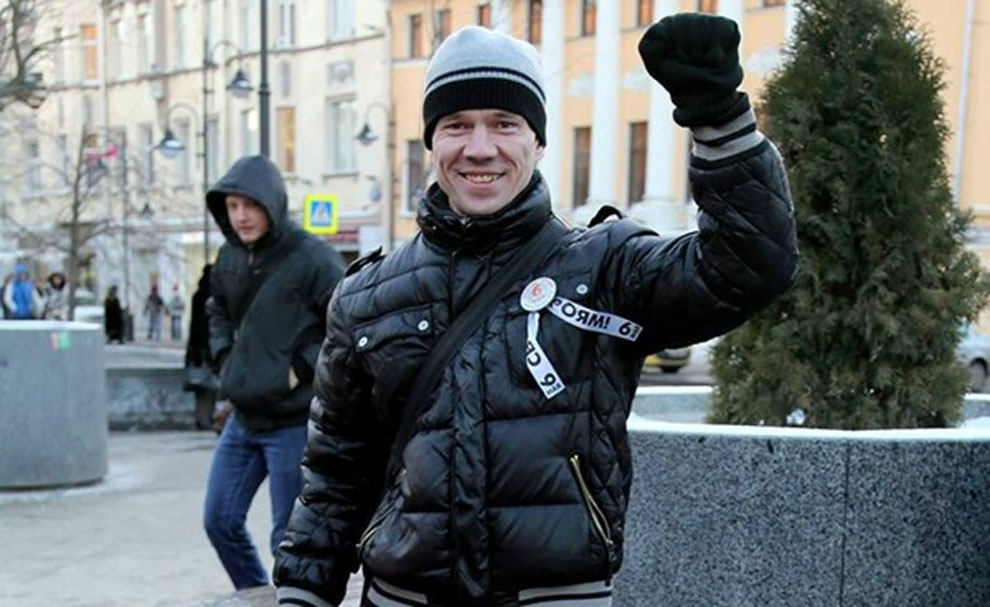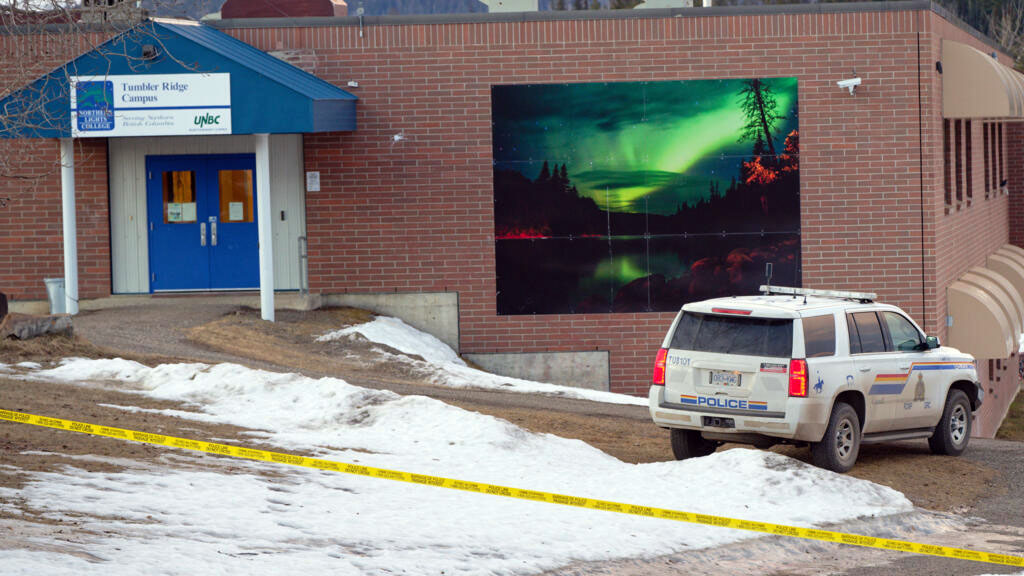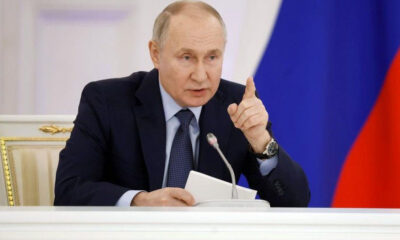International
Russian opposition activist killed fighting for Ukraine

Russian opposition activist killed fighting for Ukraine
Ildar Dadin, a well-known Russian opposition activist who was fighting in Ukraine on the side of Kyiv, has been killed in action, according to the group that recruited him.
A spokeswoman for that group, the Civic Council, told the BBC that Dadin had died, adding that “he was, and he remains a hero”.
The activist-turned-fighter was killed when soldiers from his volunteer battalion, the Freedom of Russia Legion, came under Russian artillery fire in the Kharkiv region of north-eastern Ukraine.
For now, there are no more details and the Legion itself won’t comment whilst it says a military operation is still active.
But Ilia Ponamarev, an exiled Russian opposition politician with previous links to the Legion, has told the BBC he is “certain, alas” that Dadin is dead.
Another source clarified that this was “confirmed by those who were with him in battle”.
The latest messages I’ve sent to his phone are still marked “unread”.
Ildar Dadin became known in Russia a decade ago for his persistence in staging peaceful protests as political repression there intensified.
He was the first person prosecuted under a new Article 212.1 – quickly dubbed Dadin’s Law – that in 2014 made it a criminal offence to commit repeat violations of Russia’s increasingly restrictive rules on protest.
In his case, that simply meant standing on the streets of Moscow with a banner.
Sentenced to two and a half years, Dadin was placed in a punishment cell and immediately went on hunger strike. His prison guards then tortured him to get him to stop.
READ ALSO:
- Tinubu will win Kano in 2027 – Senator Barau aide
- Pastor slumps, dies during child dedication in Maiduguri church
- Police kill three suspects involved in attempt to kidnap Delta lawmaker’s wife
Soon after his release in 2017, I met him in Moscow and he described being hung from a wall by his cuffed wrists. The guards had then threatened him with rape. He admitted that the brutality nearly broke him.
So when I learned that Dadin had joined a battalion of Russian volunteers fighting for Ukraine, I got back in touch earlier this year and we had a series of long exchanges.
“I can’t sit by and do nothing and so become an accomplice to Russian evil, to its crimes,” Dadin explained his decision to sign-up, just as principled and intense as I remembered him.
He’d always considered himself a pacifist but now listed his reasons for taking-up arms: “The aggression, the mass killing, the torture, rape and looting.” Still, he chose the callsign Gandhi.
Dadin felt deeply that that he bore personal responsibility for Russia’s full-scale invasion of its neighbour.
He argued that he and fellow Russians had failed to stop Vladimir Putin, allowing themselves to be scared off the streets by police violence and the threat of prison.
“The main thing now is to act according to my conscience,” Dadin wrote to me one night from near the frontline in Sumy.
He initially signed-up with the Siberian Battalion in June 2023 before moving to the Freedom of Russia Legion last winter – both officially part of the Ukrainian Armed Forces.
Recruits are mainly Russian citizens who hope that helping Ukraine defeat Vladimir Putin will be a first step towards ending his rule in the Kremlin.
READ ALSO:
- FG presents CNG-buses to Ekiti govt, unveils conversion centres
- Ex-Women Affairs minister Tallen’s only son dies at 42
- NYSC DG: Why corps members’ N77,000 monthly allowance is delayed
Their numbers aren’t clear, nor their effectiveness as a fighting force.
They have claimed some successes, including a cross-border incursion into Russia earlier this year at the time of Putin’s re-election.
But for Dadin, the experience wasn’t quite as he’d hoped.
He felt that some of the missions his unit were sent on were “pointless” in any military sense.
He described one battle where he ended up pinned down for eight hours by Russian fire in a bomb crater, with a drone trying to drop a grenade on him, whilst a fellow volunteer soldier bled to death.
And like many Ukrainian soldiers, he was exhausted, fighting with barely any days off and limping from a wound to his hip.
I wondered whether he might leave, but Dadin was clear his conscience would not allow him to sit “on the sidelines”.
Not whilst Ukrainians were being killed, as he put it, “by Russian criminals”.
“I tried to stop Russia – but did I do it? No,” he berated himself in one of our last chats. “And thousands of people have been killed because I did not do enough.”
Those who sent him to fight, disagree. “Ildar was strong, brave, principled and honest,” the Civic Council wrote. “That’s how we should remember him.”
Russian opposition activist killed fighting for Ukraine
BBC
International
Trump Halts Minnesota Immigration Crackdown After Fatal Shootings, Protests

Trump Halts Minnesota Immigration Crackdown After Fatal Shootings, Protests
The Trump administration has officially halted Operation Metro Surge, a controversial immigration enforcement operation in Minnesota, following widespread protests, political backlash, and the deaths of two U.S. citizens. The decision was announced by Tom Homan, the U.S. “border czar,” who confirmed that President Donald Trump approved ending the monthslong crackdown.
Operation Metro Surge, launched in December 2025, focused on the Minneapolis–St. Paul metropolitan area, deploying nearly 3,000 federal immigration officers at its peak. The operation aimed to detain undocumented immigrants, which the Department of Homeland Security (DHS) described as targeting “criminal illegal aliens.” However, reports indicate that many detainees had no criminal records, including children and U.S. citizens, raising concerns about the operation’s scope and fairness.
- Army University Professor Dies in Boko Haram Captivity After Nearly One Year
- MURIC Calls Proposed US Sanctions on Nigerian Muslims ‘Lopsided’
- Supreme Court Affirms Muslim Students’ Right to Worship at Rivers State University
The crackdown drew intense public opposition after anti-ICE protesters Renée Good and Alex Pretti were fatally shot during separate incidents in Minneapolis. The shootings intensified calls for accountability and prompted local and national criticism of federal enforcement tactics.
In a statement, Homan said, “I have proposed and President Trump has concurred that this surge operation conclude.” He noted that a drawdown of federal personnel had already begun, with a smaller contingent remaining temporarily to transition operations and coordinate with local authorities.
During the operation, DHS reported over 4,000 arrests, though critics highlighted the disproportionate impact on communities and families, emphasizing the humanitarian and civil liberties concerns arising from the surge.
Minnesota officials, including Governor Tim Walz and Minneapolis Mayor Jacob Frey, welcomed the decision, calling the operation an overreach that harmed communities and strained trust between law enforcement and residents. Civil rights groups also praised the halt but urged comprehensive immigration reforms to prevent future abuses.
The end of Operation Metro Surge marks a significant development in the national debate over immigration enforcement, sanctuary policies, and federal authority, highlighting the challenge of balancing border security with human rights and community safety.
Trump Halts Minnesota Immigration Crackdown After Fatal Shootings, Protests
International
Russia Escalates Digital Control with Attempted WhatsApp Block

Russia Escalates Digital Control with Attempted WhatsApp Block
WhatsApp has accused the Russian government of trying to completely block its messaging service in the country, a move aimed at steering users toward the state-backed app MAX. The Meta-owned platform said the effort, reported on February 12, 2026, threatens over 100 million users and undermines private, encrypted communication in Russia.
In a statement, WhatsApp said: “Today the Russian government attempted to fully block WhatsApp in an effort to drive people to a state-owned surveillance app. Trying to isolate over 100 million users from private and secure communication … can only lead to less safety for people in Russia. We continue to do everything we can to keep users connected.”
READ ALSO:
- Tumbler Ridge Massacre: Canada Investigates Shooter’s Mental Health, Police History
- Ex-Acting AGF Nwabuoku Admits Diverting N868.4 Million to Private Firms
- Kwankwasiyya Urges US Congress to Drop Kwankwaso’s Name from Bill
The attempt is part of a broader crackdown on foreign tech platforms in Russia. Authorities have previously restricted access to Facebook, Instagram, and targeted other services like Telegram. Reports indicate that Roskomnadzor, Russia’s communications regulator, removed WhatsApp from its national internet directory, forcing users to rely on VPNs to access the platform. Critics warn that such measures are designed to expand state surveillance and control over digital communication.
The government is actively promoting MAX, a domestic “super-app” similar to China’s WeChat, which combines messaging with other services. Rights advocates caution that the push toward MAX could compromise privacy protections that platforms like WhatsApp provide. Meanwhile, Kremlin officials have indicated that WhatsApp and other restricted apps could be restored if Meta complies with local data storage and regulatory laws.
WhatsApp’s statement emphasizes that the company will continue to work to keep its service accessible where possible, but the attempted block highlights Russia’s ongoing effort to enforce digital sovereignty and shift users toward state-controlled technology platforms.
Russia Escalates Digital Control with Attempted WhatsApp Block
International
Tumbler Ridge Massacre: Canada Investigates Shooter’s Mental Health, Police History

Tumbler Ridge Massacre: Canada Investigates Shooter’s Mental Health, Police History
Canadian authorities are intensifying investigations into the mental health history and prior police interactions of Jesse Van Rootselaar, the 18-year-old who carried out a deadly mass shooting in the remote mining town of Tumbler Ridge, British Columbia, on February 10, 2026. The tragedy has left the small community in mourning and raised national questions about gun control, mental health support, and law enforcement interventions.
According to RCMP Deputy Commissioner Dwayne McDonald, authorities are still unclear on the motive behind the attack, which is one of the deadliest school shootings in Canadian history. Van Rootselaar, a transgender woman who had dropped out of Tumbler Ridge Secondary School four years ago, first killed her mother and stepbrother before opening fire at the school, where she shot six more victims. The shooter later took her own life at the scene.
Investigators have confirmed that Van Rootselaar was known to police and had previous interactions with the public health system due to mental health concerns. Authorities are reviewing prior incidents, including earlier firearms seizures and her lapsed gun licence, to understand how warning signs were addressed before the massacre. British Columbia Premier David Eby said officials are working with the health system to determine “what interactions may have taken place” in the past.
READ ALSO:
- Ex-Acting AGF Nwabuoku Admits Diverting N868.4 Million to Private Firms
- Kwankwasiyya Urges US Congress to Drop Kwankwaso’s Name from Bill
- Liverpool Edge Sunderland 1-0 to Halt Impressive Home Streak
The victims include a 39-year-old female teacher and five students aged 12 and 13, with one child, 12-year-old Maya Gebala, in critical condition after trying to lock herself and classmates in a library during the attack. First responders arrived within minutes, but the scale of the violence left the tight-knit community of about 2,700 residents reeling. Hundreds gathered for a candlelight vigil to honour those killed and injured.
Prime Minister Mark Carney addressed parliament, describing Tumbler Ridge as a resilient, compassionate community of miners, teachers, and construction workers, and emphasised the need to learn from the tragedy. Flags across Canada have been lowered to half-staff for seven days in remembrance of the victims. Britain’s King Charles and Queen Camilla also expressed shock and sorrow over the massacre.
Schools in the area will remain closed for the remainder of the week as authorities continue their investigation into Van Rootselaar’s mental health background, police interactions, and access to firearms, seeking to understand how similar tragedies can be prevented in the future.
Tumbler Ridge Massacre: Canada Investigates Shooter’s Mental Health, Police History
-

 metro3 days ago
metro3 days agoIKEDC Sets Feb 20 Deadline for Customers to Submit Valid IDs or Face Disconnection
-

 Education3 days ago
Education3 days agoSupreme Court Affirms Muslim Students’ Right to Worship at Rivers State University
-

 metro2 days ago
metro2 days agoLagos Police Launch Manhunt for Suspect in Brutal Ajah Murder
-

 News2 days ago
News2 days agoAso Rock Goes Solar as Tinubu Orders National Grid Disconnection
-

 Business3 days ago
Business3 days agoNaira Could Trade Below ₦1,000/$ With Dangote Refinery at Full Capacity — Otedola
-

 metro3 days ago
metro3 days agoArmy University Professor Dies in Boko Haram Captivity After Nearly One Year
-

 International3 days ago
International3 days agoTrump Halts Minnesota Immigration Crackdown After Fatal Shootings, Protests
-

 Sports2 days ago
Sports2 days agoLookman Shines as Atlético Madrid Hammer Barcelona 4-0















